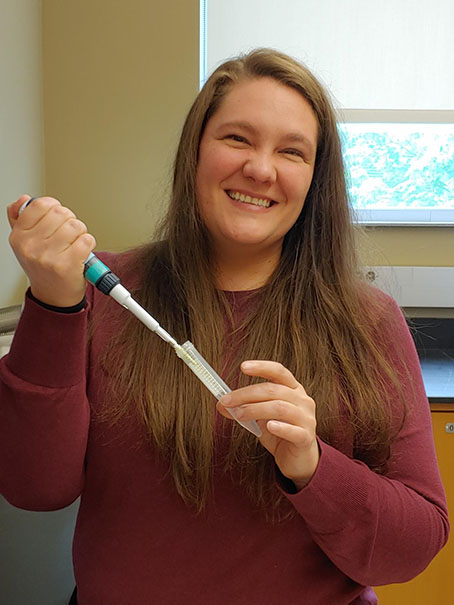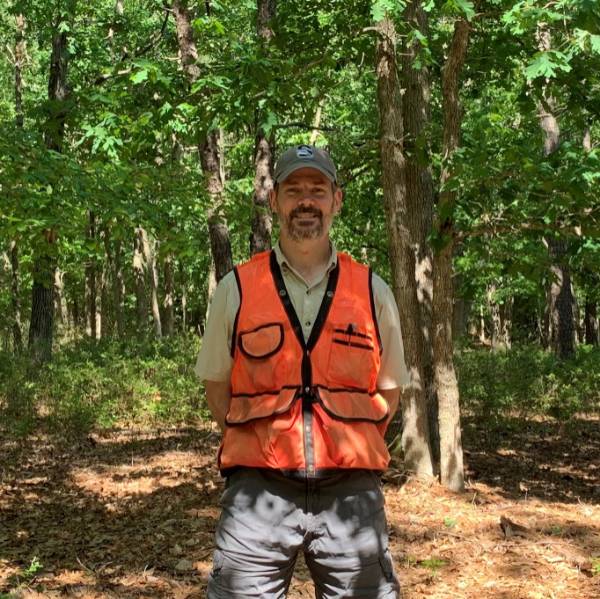Meet Our New Faculty
Meet Our New Faculty
The School of Natural Sciences & Mathematics welcomed several new faculty members over the past two academic years:
- Dr. Philip Eaton, Assitant Professor of Physics
- Shannon Keough, Teaching Specialist of Mathematics
- Dr. Jennifer Martin, Assistant Professor of Chemistry
- Dr. Lauren Seyler, Assitant Professor of Biology
- Dr. Muhammad Shah Alam Khan, Assistant Professor of Coastal Zone Management
- Dr. Matthew Olson, Assistant Professor of Environmental Science
Meet two of our new full-time tenure-track faculty:
Dr. Jennifer Martin
Assistant Professor of Chemistry

I graduated with a Bachelor of Science in biology with a concentration in genetics and developmental biology from Penn State Berks. Earning my degree at a smaller campus that really focused on small class sizes and the learning experience is what motivated me to pursue a career in education. Having the opportunity as an undergraduate student to work with faculty on an independent research project is what drew me into the sciences; knowing that I was working on solving a problem or answering a question with an unknown answer was new and exciting.
After graduating from Penn State Berks, I moved on to graduate school at the University of Virginia (UVA), where I earned my Ph.D. in chemistry. I worked with Dr. Linda Columbus, who not only taught me about scientific research, but also how to work on finding a work-life balance. My graduate research focused on understanding the interactions between membrane proteins and receptors that allow the pathogens that cause gonorrhea and meningococcal meningitis to colonize human tissue, potentially causing these infections.
After I graduated with my degree, I was offered an incredible teaching opportunity with my mentor, Dr. Columbus, to continue with my research and to help redesign the general chemistry class and curriculum at UVA. I stayed there for a few more years where I was able to not only work on improving the undergraduate chemistry experience for undergraduate students, but also taught sections of general chemistry as well, and continued to conduct research. It was during this time that the desire to go back to a smaller class environment and build my own lab to do research with undergraduate students began to take place.
When I moved to Stockton, I refocused my research interests to make them more accessible for undergraduate students to work on. Rather than projects that require 4+ years of focused, intense research, I developed a project that will allow students to make substantial contributions via smaller independent projects that are related. As a biochemist, I enjoy learning about how the world around us works on a molecular scale.
To me, research on proteins is the perfect combination of using chemistry and biology to help determine how biological organisms function."
My research at Stockton focuses on the characterization of soluble bacterial proteins - experimentally determining how they function, and different factors that affect their functions. In 2000, the National Institutes of Health (NIH) funded the Protein Structure Initiative, which focused on protein structure determination. Over 6,900 structures were determined; ~35% of those structures have completely unknown functions and even more, have unconfirmed putative functions. While a fundamental principle of biochemistry is that protein structure dictates function, biological evolution operates at the level of function, emphasizing the importance of characterizing the functions of these proteins.
I came to Stockton in 2020, and thus far have had the delight of working with a few students on this research. I am excited about what we have done so far and am looking forward to working with more students to continue this project. Being at Stockton has given me a great opportunity, and I am thrilled to be a member of the Stockton faculty and contribute to the excellent research and learning environment that I have found here.
Dr. Matthew Olson
Assistant Professor of Environmental Science

I grew up in southern Medford Township on the western edge of the Pine Barrens. My interest in trees and forests took root at an early age. When I wasn’t in school or on a soccer field, I was spending quality time with friends and family exploring the woods or fishing the lakes in Medford. Once I learned that forestry was a career option, I knew exactly what I wanted to study in college.
I had the privilege of learning about forests and their management in college forestry programs in the northeastern and southeastern US. I received undergraduate degrees in forestry from Paul Smith’s College (AAS) and the University of Maine (BS). My graduate education included the University of Tennessee (MS) where I studied oak regeneration ecology in southern Appalachian forests and the University of Maine (PhD) where I continued my study of forest regeneration in northern conifer-hardwood forests. For my dissertation, I combined several long-term forestry experiments in central Maine to evaluate the spatial and temporal patterns of forest regeneration under alternative sustainable timber harvesting practices (i.e., silviculture). One of these studies is a USDA Forest Service experiment on the Penobscot Experimental Forest that has been active for nearly 70 years.
Spring 2021 marks my fourth semester at Stockton University. Prior to Stockton, I
was an Assistant Professor in the College of Agriculture, Forestry, and Natural Resources
at the University of Arkansas-Monticello (UAM). There I taught several forestry classes,
mentored graduate students (all MS level), and initiated collaborative forestry research.
Before UAM, I was as a forest scientist with the Missouri Department of Conservation
(MDC). My primary responsibilities in MDC were identifying information gaps to sustainable
forest management and initiating research designed to inform stewardship of state
forests in the Show-Me State. I also helped direct a long-term, landscape-scale forestry
experiment in the Ozarks (https://research.mdc.mo.gov/project/mofep).
Regardless of where I’ve been or what I was studying, I have always maintained an
interest in New Jersey forests, especially the forests of the Pine Barrens. My research
program at Stockton reflects this interest and a desired to apply the findings of
my research to support forest stewardship. I am currently working with students in
the Environmental Sciences Program on several projects both on university land and
local state forests. I am particularly excited about initiating research to support
stewardship activities in the woods on Stockton’s main campus. This research includes
investigating effects of prescribed fire, tree planting, and maple sap harvesting
for syrup.


